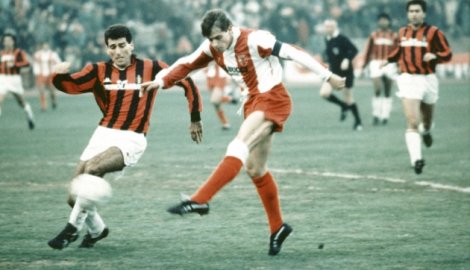The time when Stojkovic played on the wrong side and renounced to take a penalty kick against his team, Red Star Belgrade
Carlo Perigli [translated by Azzurra Enei]

On May, 29th 1991 the Champions League final took place at San Nicola stadium in Bari, Italy.
The strong French team Olympique Marseille,led by the ace Jean-Pierre Papin is up against Red Star Belgrade, a bunch of wild, bad boys steeped in such technique and foolhardiness that will take them straight to the soccer Hall of Fame.
Their generation is the one of Savicevic, Mihajlovic, Prosinecki, Jugovic and Pancev and, most of all, their team is the one of the legendary Dragan ‘Piksi’ Stojkovic, the most popular soccer player in the history of the Belgradan team.
ON THE WRONG SIDE – By a bitter twist of fate Stojkovic that night was unimaginably on the wrong side, on the sidelines, wearing the impressive Olympique Marseille tracksuit.
The previous summer he had accepted the enticing offer of Bernard Tapie, the president of the above mentioned French soccer club as well as the owner of Adidas, and left his homeland in the hope of winning the cup that he had missed some years before in the semi-final.
Now the events have taken an unexpected twist since his old team-mates and friends, which used to be and are his brothers, are his opponents at the moment and they are competing for the most sought-after trophy of European soccer.
Stojkovic is there, almost “thankful” for the injury that ruined his season and prevented him from being among the first string player.
IT’S YOUR TURN, PIKSI – Nine minutes before the end of the match Stojkovic is asked to join the fray, this is Goethals’ final trump in order to win the “old big ears”. When he enters the field the crowd roars. No, they aren’t French supporters who welcome a phenom with matchless feet, they are the Yugoslavs who want to embrace their son. They aren’t nursing grudge against him and they aren’t thinking that his magic feet could shatter the dream that bound three of the Yugoslav folks, even before Western diplomacies did.
AN EMOTIONAL CHOICE– The extra time doesn’t suffice to break the deadlock, so the teams come the final lottery. But while Goethals is calling his player to decide who is going to take the penalty kicks Stojkovic goes near him andcommunicates his will: he is not going to take any of the five penalty kicks. Be sensible, Piksi: you’ve been pursuing this trophy during your entire career. You who, as Savicevic, are the supreme expression of Yugoslavan soccer. You, who are genius and intemperance together, are finding yourself within an inch of the trophy. That trophy you had a brush with two years before, and disappeared in the damned, unlikely mist of Belgrade. Do you remember? You were a bunch of bad boys and demolished Arrigo Sacchi’s Milan, a team of billionaire champions, who won the match thanks to the suspension ordered by the referee. And now you’re here, close to victory, you just have to do what you normally succeed in doing. The rest will pass off, all wounds will heal. No, you can’t because there’s “Dika” Stojanovic standing in front of you. He welcomed you like a brother in Belgrade, you use to train together and then go out for a bracer of rakija. His people areyourpeople. In Stojkovic’s mind many thoughts are scudding as fast as his dribbles that stunned hundreds of defenders. But neither technique nor fame played a role in Piksi’s decision that night. You can’t rule the hearth.
